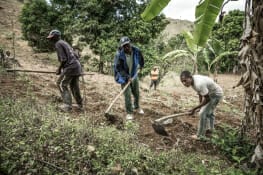
In spite of the progress made in the last decades in the field of Zero hunger crisis management and prediction,…
Discover moreWeWorld has been in Haiti since 2010 when a devastating earthquake struck the island, causing over 220,000 victims and the spread of a terrible cholera epidemic.
Haiti is one of the poorest countries in the world. Its economy has repeatedly been hit by political crises and a series of devastating natural disasters. It is estimated that 59% of Haitians live in poverty and 25% in conditions of extreme poverty. The economic vulnerability of most Haitian families, the weakness of the institutions and infrastructures as well as the environmental degradation make Haiti one of the countries most subject to the negative consequences of natural shocks.
Our intervention is based on the pursuit of endogenous, sustainable and inclusive development, which enhances local resources and skills. We work to foster soil protection, reforestation and water management, ensuring the improvement of the working conditions and an increase in income for hundreds of farmers and for their families at the border of the country, affected by long periods of drought and by a very high rate of deforestation.
We intervene in favour of the most vulnerable groups of the population with actions to improve health services, in particular in the fight against malnutrition through diagnosis and nutritional recovery. Likewise, we have supported the creation of food safety networks based on local supply.
In Haiti we work to strengthen non-governmental organisations and to support local democracy and decentralisation processes, which are fundamental elements in order to assure the redistribution of wealth and development. Thousands of organisations have been accompanied in a process of training, technical assistance and in the establishment of municipal and departmental networks in order to be able to communicate effectively with the local authorities.
In spite of the progress made in the last decades in the field of Zero hunger crisis management and prediction,…
Discover moreHurricane Matthew hitting Haiti in 2016 caused the worst humanitarian Human mobility since the 2010 earthquake. Even though the Central…
Discover moreHaiti is one of the poorest States in the word: more than half of the population lives below the poverty…
Discover moreThe project is implemented in a context characterized by a lack of connections between civil society and local authorities. The…
Discover moreThe project aims to reduce the impact of soil erosions in the area between Haiti and the Dominican Republic, that…
Discover moreIn the targeted areas remain several problems caused by the adoption of unsustainable agricultural practices. In addition, the area’s isolation,…
Discover moreIn the context of extreme vulnerability of the rural families living in the Central Department, it is fundamental to reinforce…
Discover moreSparring Partner is a cultural program aimed to develop the branch of film industry specialised in documentaries production in Haiti,…
Discover moreDirect project beneficiaries included the residents of the three communities inside the Nippes Department (l’Asile, Fond des Negres, Paillant), while…
Discover moreThe entire population of the Fonds Des Negres and Paillant and L’Asile communities, benefited from the early warning system and…
Discover moreThe ODPP (Organization for the Development of Farmers in the Plains), officially founded in 2009, has 266 members, 233 of…
Discover moreThe children of the Ravin-Parc community benefited from the construction of the school, and the entire community was involved in…
Discover more






